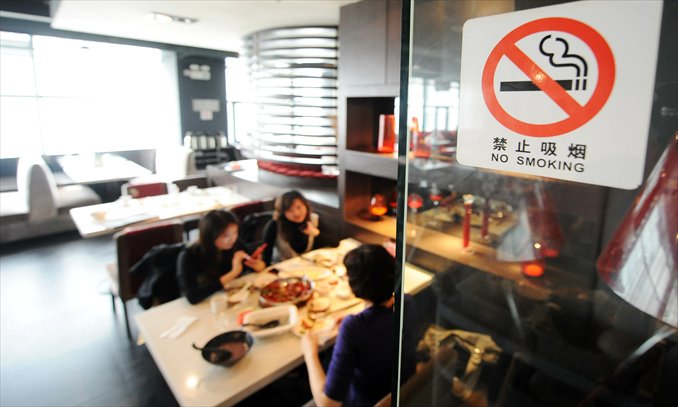Just saying no

The ban on cigarettes in restaurants is only as effective as its enforcement. Photo: CFP
Wang Qian loves dining out but hates secondhand smoke. Whenever she encounters smokers in a restaurant, she feels compelled to speak up and defend her right to eat in an environment free of the 69 carcinogens found in cigarette smoke. Now, after hearing about a woman who was assaulted for trying to enforce the smoking ban in indoor public spaces, Wang considers herself lucky.
A tourist surnamed Zhang from Shanghai angered three diners by photographing them smoking in a café in Chaoyang district. She was gathering evidence to report them but it turned into a scuffle, in which Zhang was struck in the head and knocked to the ground.
"As a woman, I dare not anger them - most are men, you know," said Wang. "You have to be very careful and courteous when bringing up the subject." One of her friends once politely reminded a man not to smoke in a massage parlor. He responded by blowing a big smoke ring in her face. "It's possible that most smokers are good people who would be willing to stub out their cigarettes if asked," Wang insists.
Few people go to the lengths that she does. Most other non-smokers, unwilling to cause a scene, have resigned themselves to a smoky dining environment. Cigarettes are outlawed in most restaurants, but only a few strictly implement a full ban. According to a national survey, 88.5 percent of customers are exposed to secondhand smoke in restaurants.
"The restaurants have become an area with much exposure to secondhand smoke," said Li Qiang, a former research fellow with the Tobacco Control Office of the Chinese Centers for Disease Control and Prevention (CDC).
Wang Xinyuan, the research fellow in charge of the smoke-free restaurants project of Nature University, an environmental NGO, told Metropolitan that average PM2.5 concentrations can reach 40 in smoke-free restaurants, 184 in partly smoke-free restaurants and 280 in smoking restaurants, according to a four-month survey of more than 51 Beijing restaurants by the NGO's volunteers. (An index of 151 or above is considered unhealthy.)
"The survey also found that customers sitting in no-smoking areas cannot avoid inhaling secondhand smoke," Wang Xinyuan said.
Restaurant managers have struggled with implementation of the smoking ban. The manager of the Beihai branch of Otto's Restaurant, a Hong Kong-style chain, who asked to remain anonymous, told Metropolitan that even though his is ostensibly a smoke-free restaurant, some customers do break the rules.
"We will ask them not to smoke, but if they refuse, there is nothing we can do," he said, adding that customers who complain about the secondhand smoke can sometimes be moved to another table.
Some restaurant owners also fear that enforcing a total ban on smoking will drive customers away.
However, Cheng Ting, a long-time server at the Jin Ding Xuan restaurant chain, told Green Living magazine that such fears are unfounded.
"When the ban was launched, customers did leave after learning about our new policy, but it was just a few of them. Meanwhile, we attracted some non-smoking customers," said Cheng.
Recently, Wang Qian has started using a smartphone app called Smoke-free Restaurants to find eateries where she won't have to ask fellow diners to stop smoking. Launched last October, the app lists over 700 restaurants in Beijing.
But it's only a small step.
Smoke-free regulations should be set for all public spaces, said Yang Gonghuan, the CDC's former deputy director, who admitted that effective enforcement of the regulations is also necessary.